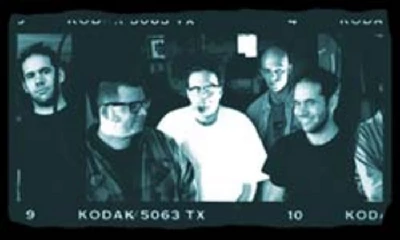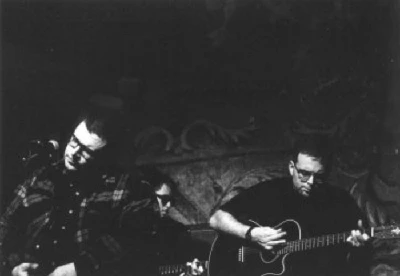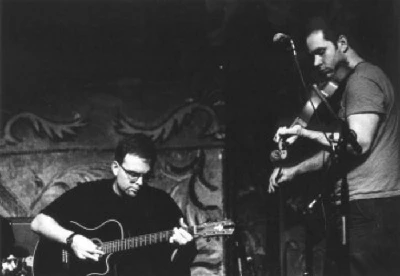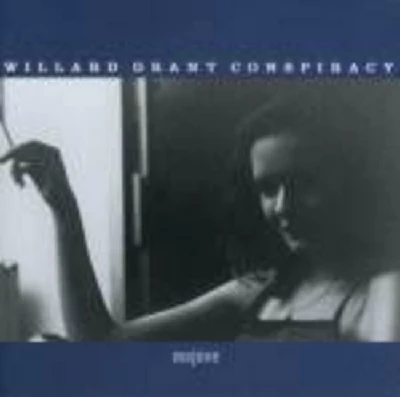published: 1 /
1 /
2000

On April 19th Robert Fisher, singer with Boston band The Willard Grant Conspiracy, was in London to promote the group's's new album, 'Mojave', and gave an interview to Pennyblackmusic.
Article
On April 19th Robert Fisher, singer with Boston band The Willard Grant Conspiracy, was in London to promote the group's's new album, 'Mojave', and gave an interview to Pennyblackmusic.
The Willard Grant Conspiracy were first formed in 1996 by Robert and guitarist, Paul Austin, who are the group's main songwriters and its principal members. The band define their music as 'swamp noir', but are often also described as a 'new country' group. Their music is beautifully moody and introspective, and often has a haunted, melancholic feel. As well as relying on guitars, the band also use roots-based instruments such as mandolins, strings, concertinas and accordions.
The Willard Grant Conspiracy's debut album '3am at Otto Fortune's' was self-released at the tail end of 1996. Their second album 'Flying Low'', released on Slow River, came out in March 1998. 'Mojave', their third album, which Robert co-produced with Pete Weiss at Zippah studios in Brooklyn, Massachusetts, and which again will come out on Slow River, is due out in Europe on May 17th and later on in the year in America.
PB : Why did you decide to call the new album 'Mojave' ?
RF : There's a couple of reasons. There's a few songs on this record that are placed there for one thing. I grew up in California, and I spent some time in the desert as a kid, and it's a pretty powerful place. Some of these songs are positioned there. 'The Work Song' mentions 'Mojave', and a few other songs like, 'I Miss You Best', 'Love Has No Meaning' and a couple of other things are all also generally placed there.
It's also because when you're coming up with a title for a record you want something that's kind of evocative, and makes people say things like why did you call it that ? (Laughs) I think that there are some comparisions too, not to get too stupid about it, between the geographic elements of the desert and our music. The desert's a really beautiful place, and very subtle and striking in terms of its textures. I think our music is kind of similar to that in some respects.
PB : When was the new album recorded, and how long did it take ?
RF : It was recorded during the Fall into Winter. We got off tour in October, and we started recording in November. It took through November and December to get it done, and I finished the master in January.
PB : You recorded it at Zippah Studios, which uses a lot of wonderful old equipment. Both 'Mojave' and the last album 'Flying Low', which was also recorded there, have a really timeless feel. Do you think using Zippah perhaps enchanced recordings ?
RF : I absolutely feel that way! Yes ! The thing about Zippah is we recorded on sixteen and twenty four track analogue equipment there, not digital equipment. They also have all these great old microphones, a fifty year old Neumann that we do a lot of the vocals and lot of the guitar stuff through, and there's an old Neve board up there too. There's a feel to that, and a sound to that which you just don't get on digital equipment.
PB : Mojave seems perhaps a quieter, more reflective album than 'Flying Low'. Was it intended that way, and do you see it in some ways a change in direction for the band ?
RF : No, I don't actually. I hate to disagree with you. It's interesting that you say it's a quieter, more reflective record, because there's some songs on here that are louder than anything on 'Flying Low'.
PB : Something like 'Go Jimmy Go' is pretty frantic
RF : Yeah ! And 'The Visitor' is pretty out there as well, and in some ways so is 'Sticky'. A lot of these songs are songs we have playing over the last year and a half, two years on tour. 'The Work Song' is one of those songs,and so are 'How to Get to Heaven' and 'Front Porch'. There's also a lot of stuff here that I wrote specifically for the record. I guess I see it as a natural extension of what's been happening in the band over the last two years.
PB : A lot of your lyrics tell stories, and give descriptions and insights into characters' lives. Where do you get these ideas from ? How much of it is personal, and how much of it is simply observation ?
RF : I think any good songwriting is a percentage of all of that. There's a certain percentage which is sort of autobiographical. There's a certain percentage which is observational, and there's a certain percentage that's just pure fiction, and songwriting works because of that. If you wrote something that was purely autobiographical, nobody would want to listen to it (Laughs). Nobody would identify with it at all. It's important to be observational, and to find universal chords that you can strike in the listener hopefully.
The great thing about any kind of creative endeavour is like you can put five people in a room and have them read a short story and ask them what they got from the short story. Each one of them will tell you a totally different thing. I love when people walk up and say 'Hey ! That song' so cool ! It's about this and that !' and I'm like' Well ! That'a great interpretation, but I didn't mean it that way, but thanks'. I think the words are kind of designed to do that for people.
PB : There were over fifteen musicians involved in the recording of 'Mojave'. The band's principal members have always been yourself and Paul Austin. Who else, if anyone, have become regular members of the group ?
RF : There's Sean O' Brien who plays guitar with us ; David Curry who plays viola ; James Apt who plays guitar, and Eric Groat who plays mandolin. That's the core membership of the band. Then there's a whole bunch of other people that we're really fortunate to have play with us. We played a show last Wednesday and there were ten people on stage with us, so at any given time there can be anywhere between four to ten or twelve people.
On this record there's some really great guest performances. Edith Frost sings all over the record. I don't know if you know her work or not, but she's on Drag City and she's terrific. And Chris Brokaw plays drums. Chris was the drummer in 'Codeine'.
PB : And you have Malcolm Travis from 'Sugar' ?
RF : Yeah ! And Malcolm Travis is also on here. Malcolm and I go way back. It's always a great experience having him play. Walter Salas-Humara from 'The Silos' also plays. One of the joys of doing this band that it is open-ended enough that I can invite people to come on and play.
PB : You're also releasing a CD of extra tracks at the same time as 'Mojave'-'Radio Free Mojave'. How can you get a hold of it ?
RF : What they're doing is putting a card in 'Mojave' itself, and just offering it to people for what is the equivalent of cost plus shipping, or something like that. It's, therefore, going to be available that way, and strictly through the mail ! What it is is a sort of odds and ends CD in a way. There's some extra tracks, and an alternative take of one song that's on 'Mojave'.On 'Mojave', like '3am' and on 'Flying Low', there's some instrumental bits between the songs, and there's also some extended versions of these on 'Radio Free'.
PB : 'Mojave' is going to be released over here next month on May 17th. It's coming out in America at a later date. When will the American release be, and why the delay ?
RF : I think it's probably going to be the Fall. The reason is that the band needs to be around to support and play when it is released. We're actually going to be here in June, and touring through the month, and coming back between September and October. If we're not in the United States, it just doesn't make sense to release it. That's why there's the delay.
PB : Do you know yet how many musicians are going out on the European tour ?
RF : Yeah ! I think five (Laughs) But I'm not sure. What's going to happen actually is that there's four of us coming over from the U.S., and there's also a Dutch musician who will be playing with us. Edith Frost will also be playing with us, because she is touring with us. I'm hoping to rope in others folks as we go along. Peter Bruntnell is going to be playing with us on tour, and opening the shows, and he's been threatening to learn lap steel to some of the songs, so I may take him up on that.
PB : The band has a remarkably prolific output. There's been three albums in as many years, and appearances also on compilation albums like 'A Place to Call Home'. How is the average composition put together , and is there a structure ?
RF : Usually Paul and I write the songs and take them to the band, and they basically do their own freefall interpretative dance on them. The songwriting can be really varied ! Sometimes it's just me figuring out the song, and taking it to Paul and saying 'Fix It'. Sometimes it's the two of us sitting in a room, and throwing ideas back and forth at one another. We've been writing together for a long time, so there's a really interesting situation now where we don't have to talk about it a whole lot.
Sometimes too things just happen which is really great ! There's a couple of songs on here like that . 'I Miss You Best' is one. We were actually rehearsing one night with James in his apartment, and he got up to answer the phone, and while he was at the phone 'I Miss You Best' just floated in the window and landed, and it was a whole song. It just came out that way, so sometimes that happens too.
PB : Do you ever bring the lyrics with you to sessions, or do you write them once you get there ?
RF : Both ! I have notebooks that I carry around with me, and I have lyrics in them. My lyrics are usually not just fragments of things. They're full-born ideas, and then Paul will be playing something, and I know that it will fit and its works that way. Sometimes too I just make them up as they happen.
PB : There's a story that you wore sunglasses throughout the recording of 'Mojave' ? Is that true ?
RF : (Laughs) No ! Actually it happened on another recording ! I did a recording for some friends of mine in New York, this band called Idle, and they were part of a compilation doing Burt Bacharach songs, and on the recording I wanted to do some Phil Spectorish sort of things. We had six acoustic guitar players playing the same chord. So, as a kind of joke, but also as a half-serious thing, I wore my sunglasses the entire time I was doing that session in honour to Phil.
PB : You've obviously got the European tour coming up in June. What are the band's plans once that is over ?
RF : Well, we'll got home for about a month and a half, and then I hope we're coming back possibly to play some festivals in August. Then we tour with 'The Walkabouts' through September into October, and I think The Walkabouts are planning to do a show at least in London, although I don't know. It might be more than that, as they're also talking about Dublin as well, so we might be back for that.
PB : Thank you very much !
RF : Thank you
Band Links:-
https://en-gb.facebook.com/WillardGran
https://twitter.com/willardgrant
https://www.willardgrantconspiracy.com
https://en.wikipedia.org/wiki/Willard_
Picture Gallery:-


